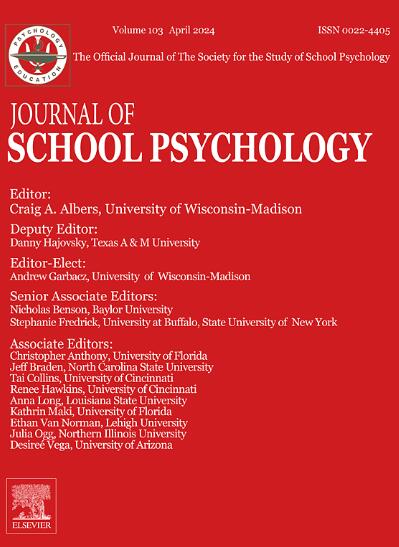Conjectures and refutations in cognitive ability structural validity research: Insights from Bayesian structural equation modeling
IF 4.1
1区 心理学
Q1 PSYCHOLOGY, SOCIAL
引用次数: 0
Abstract
The use of Bayesian structural equation modeling (BSEM) provided additional insight into the WISC–V theoretical structure beyond that offered by traditional factor analytic approaches (e.g., exploratory factor analysis and maximum likelihood confirmatory factor analysis) through the specification of all cross loadings and correlated residual terms. The results indicated that a five-factor higher-order model with a correlated residual between the Visual-Spatial and Fluid Reasoning group factors provided a superior fit to the four bifactor model that has been preferred in prior research. There were no other statistically significant correlated residual terms or cross loadings in the measurement model. The results further suggest that the WISC–V ten subtest primary battery readily attains simple structure and its index level scores may be interpreted as suggested in the WISC–V's scoring and interpretive manual. Moreover, BSEM may help to advance IQ theory by providing contemporary intelligence researchers with a novel tool to explore complex interrelationships among cognitive abilities—relationships that traditional structural equation modeling methods may overlook. It can also help attenuate the replication crises in school psychology within the area of cognitive assessment structural validity research through systematic evaluation of complex structural relationships obviating the need for CFA based post hoc specification searches which can be prone to confirmation bias and capitalization on chance.
认知能力结构效度研究中的猜想与反驳:来自贝叶斯结构方程模型的启示
贝叶斯结构方程模型(BSEM)的使用,通过规范所有交叉载荷和相关残差项,为wiscc - v理论结构提供了超越传统因子分析方法(如探索性因子分析和最大似然验证性因子分析)的额外洞察。结果表明,在视觉空间和流体推理组因子之间具有相关残差的五因子高阶模型优于先前研究中首选的四双因子模型。在测量模型中没有其他统计上显著的相关残差项或交叉负荷。结果进一步表明,WISC-V十分项测试原电池易于获得简单的结构,其指标水平得分可以按照WISC-V评分和解释手册中的建议进行解释。此外,BSEM为当代智力研究人员提供了一种探索认知能力之间复杂相互关系的新工具,从而有助于推动智商理论的发展,这种关系是传统结构方程建模方法可能忽略的。它还可以通过系统地评估复杂的结构关系来减少学校心理学在认知评估结构效度研究领域的复制危机,从而避免了基于CFA的事后规范搜索的需要,这种搜索容易产生确认偏差和偶然的大写。
本文章由计算机程序翻译,如有差异,请以英文原文为准。
求助全文
约1分钟内获得全文
求助全文
来源期刊

Journal of School Psychology
PSYCHOLOGY, EDUCATIONAL-
CiteScore
6.70
自引率
8.00%
发文量
71
期刊介绍:
The Journal of School Psychology publishes original empirical articles and critical reviews of the literature on research and practices relevant to psychological and behavioral processes in school settings. JSP presents research on intervention mechanisms and approaches; schooling effects on the development of social, cognitive, mental-health, and achievement-related outcomes; assessment; and consultation. Submissions from a variety of disciplines are encouraged. All manuscripts are read by the Editor and one or more editorial consultants with the intent of providing appropriate and constructive written reviews.
 求助内容:
求助内容: 应助结果提醒方式:
应助结果提醒方式:


